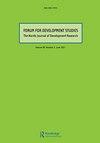Formalisation of Street Vending in Dar es Salaam: Implementation and Enforcement of the Wamachinga Identity Card Initiative
IF 1.1
Q3 DEVELOPMENT STUDIES
引用次数: 2
Abstract
Abstract Street vending in urban Tanzania is a big sector that touches different activities. This research paper applies the ‘forbearance’ conceptual understanding to investigate the introduction and implementation of small traders’ Identity Cards or simply Wamachinga IDs as an official formalisation strategy. It reports the findings of a qualitative research design undertaken to explain the process of formalisation of street vendors and their trade in Dar es Salaam region. Multiple interpretations of the strategy were noted, such as a technique to collect data for further planning, a revenue collection tactic and an approach to equality between informal and formal traders. The study found that stakeholders embraced the initiative as progress towards gaining business freedom and access to improved earnings while boosting the government's coffers from the so-called informal sector. Additionally, the study found that the initiative had exposed challenges such as the lack of some important personal information in the IDs. It is hence sometimes dismissed as a politically-motivated initiative lacking legality. Moreover, the Local Government Authorities (LGAs) face challenges in managing business waste, business spaces, congestion and collection of some other revenues. Some formal business people/enterprises were reported to recruit young men and buy them Wamachinga IDs to sell items on their behalf. This was noted as a trick for tax evasion, which impedes tax compliance efforts. The study, therefore, recommends a participatory approach to improving the Wamachinga ID initiative alongside related by-laws to address the challenges this ID system faces.达累斯萨拉姆街头贩卖的正规化:Wamachinga身份证倡议的实施和执行
摘要坦桑尼亚城市的街头贩卖是一个涉及不同活动的大部门。本研究论文应用“宽容”的概念理解来调查小贸易商身份证或简单的Wamachinga ID作为官方正式化策略的引入和实施。它报告了一项定性研究设计的结果,该研究旨在解释达累斯萨拉姆地区街头小贩及其贸易的正规化过程。与会者注意到对该战略的多种解释,如收集数据以进行进一步规划的技术、收入收集策略以及实现非正式和正式贸易商平等的方法。研究发现,利益相关者接受了这一举措,认为这是在获得商业自由和获得更高收入方面取得的进展,同时从所谓的非正规部门增加了政府的金库。此外,研究发现,这一举措暴露了一些挑战,如身份证中缺乏一些重要的个人信息。因此,它有时被视为一项缺乏合法性的出于政治动机的倡议而不予理会。此外,地方政府当局在管理商业废物、商业空间、拥堵和其他收入方面面临挑战。据报道,一些正式的商人/企业招募年轻男子,并为他们购买Wamachinga身份证,以代表他们销售商品。这被认为是逃税的伎俩,阻碍了税收合规工作。因此,该研究建议采用参与式方法来改进Wamachinga身份证倡议,同时制定相关细则,以应对该身份证系统面临的挑战。
本文章由计算机程序翻译,如有差异,请以英文原文为准。
求助全文
约1分钟内获得全文
求助全文
来源期刊

FORUM FOR DEVELOPMENT STUDIES
DEVELOPMENT STUDIES-
CiteScore
1.80
自引率
14.30%
发文量
24
期刊介绍:
Forum for Development Studies was established in 1974, and soon became the leading Norwegian journal for development research. While this position has been consolidated, Forum has gradually become an international journal, with its main constituency in the Nordic countries. The journal is owned by the Norwegian Institute of International Affairs (NUPI) and the Norwegian Association for Development Research. Forum aims to be a platform for development research broadly defined – including the social sciences, economics, history and law. All articles are double-blind peer-reviewed. In order to maintain the journal as a meeting place for different disciplines, we encourage authors to communicate across disciplinary boundaries. Contributions that limit the use of exclusive terminology and frame the questions explored in ways that are accessible to the whole range of the Journal''s readership will be given priority.
 求助内容:
求助内容: 应助结果提醒方式:
应助结果提醒方式:


